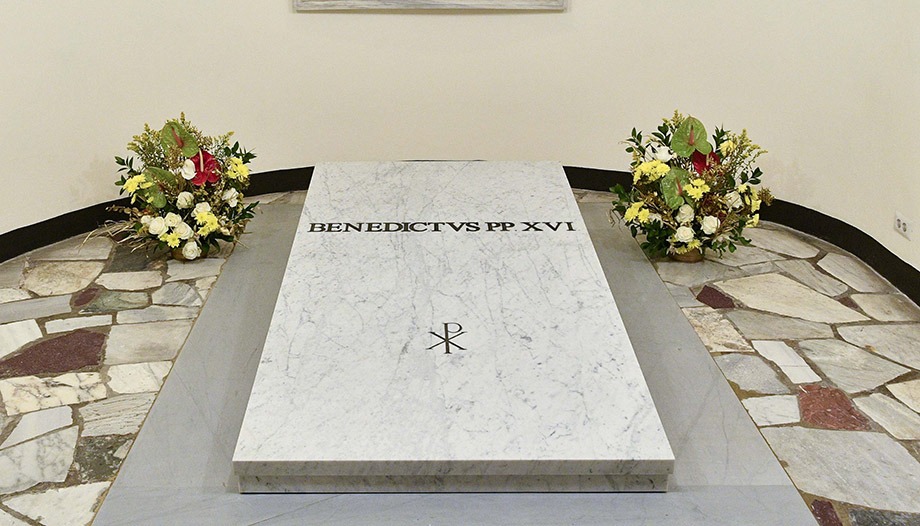 The Magisterium of Benedict XVI
The Magisterium of Benedict XVI Freedom, sanctity and reason in the teaching of Benedict XVI
Freedom, sanctity and reason in the teaching of Benedict XVI Benedict XVI, a prophet in Israel
Benedict XVI, a prophet in IsraelThe last words of Benedict XVI on his deathbed, before his death, as his personal secretary tells us, were "Jesus, ich liebe dich" ("Jesus, I love you", in German). In that crucial moment in which we find ourselves alone before the Lord, there is no room for imposture; what has marked our life flows directly from the heart. And the summary of the German pope's life was this great and unique love.
With this, Pope Benedict XVI, that great teacher, gave us a great lesson, the last and definitive one. Only love is what marks life. Only that which we have loved is what will remain eternal. At the sunset of life, as St. John of the Cross said, we will be examined in love. Only in that.
Perhaps it would not be superfluous for those of us who dedicate ourselves to education and the transmission of the faith to remember this lesson. The mind and the will must be formed. It is necessary to introduce into the mystery of the supernatural. One must commit one's life and give it away. But all this is worthless if it is not done out of love, as the Apostle Paul reminded the Christians of Corinth.
That is why our main mission is, above all, to introduce children and young people to this love story. To accompany them in getting to know Jesus Christ. To introduce them to this personal relationship, which is the essence of Christianity. And with our own life, to teach them that Christ, alive and risen, is the great love of our life.
This is the farthest thing from sappiness and sentimentality. Only a true love sustains the yes in difficulty, crosses the frontiers of pain, becomes definitive until death. Especially the love of Christ has very little to do with 'butterflies in the stomach', because it is a real love, but transcendent. And if it can be touched, it is in the flesh of the wounded brother, it is in the daily Bread. And that gives for few butterflies. It is enough for something much greater. To intuit that love that only fits in the heart of God.
My question as an educator is whether we are really introducing young people to that love of Christ. Because if we are not, no matter how much paraphernalia we put up, we will do absolutely nothing. Pope Benedict constantly reminded us of this. Being a Christian is born of an encounter, not of a moral conviction. And that encounter with Jesus cannot leave us indifferent. As our youth catechists used to repeat to us, 'it is not possible to know Jesus and not love him; it is not possible to love him and not follow him'.
Therefore, the first step is to make Jesus known. And the main way to do this is to introduce them to a prayerful relationship with Scripture. Reading and praying the Gospel will be the way that can put young people in contact with the Word Incarnate. And teach them to discover him in the silence of our own soul, in the last recesses of our being.
Music in particular, and art in general, will be a door that will help to awaken sensitivity and facilitate this encounter. But the body to body, the contact, the touching that love demands, is given in prayer and, in a privileged way, in the bread of the Eucharist.
St. Manuel Gonzalez, the bishop of the abandoned tabernacle, speaking of a girl who wanted to receive her First Communion early, said that he was reluctant because of her young age and therefore encouraged her to wait. But the girl argued with the wisdom of her heart that she needed to receive communion, 'because to love each other you have to touch each other'. That was enough to convince the holy bishop.
To love each other you have to touch each other, you have to touch each other. Love is born from a personal encounter.
Benedict XVI gives us that definitive lesson of tender and intimate love in his last words. His heart beat to the rhythm of that love. His last breath was to proclaim with a voice at once faint and powerful that love is the ultimate word that sustains our life.
Teaching Delegate in the Diocese of Getafe since the 2010-2011 academic year, he has previously exercised this service in the Archbishopric of Pamplona and Tudela, for seven years (2003-2009). He currently combines this work with his dedication to youth ministry directing the Public Association of the Faithful 'Milicia de Santa Maria' and the educational association 'VEN Y VERÁS. EDUCATION', of which he is President.











